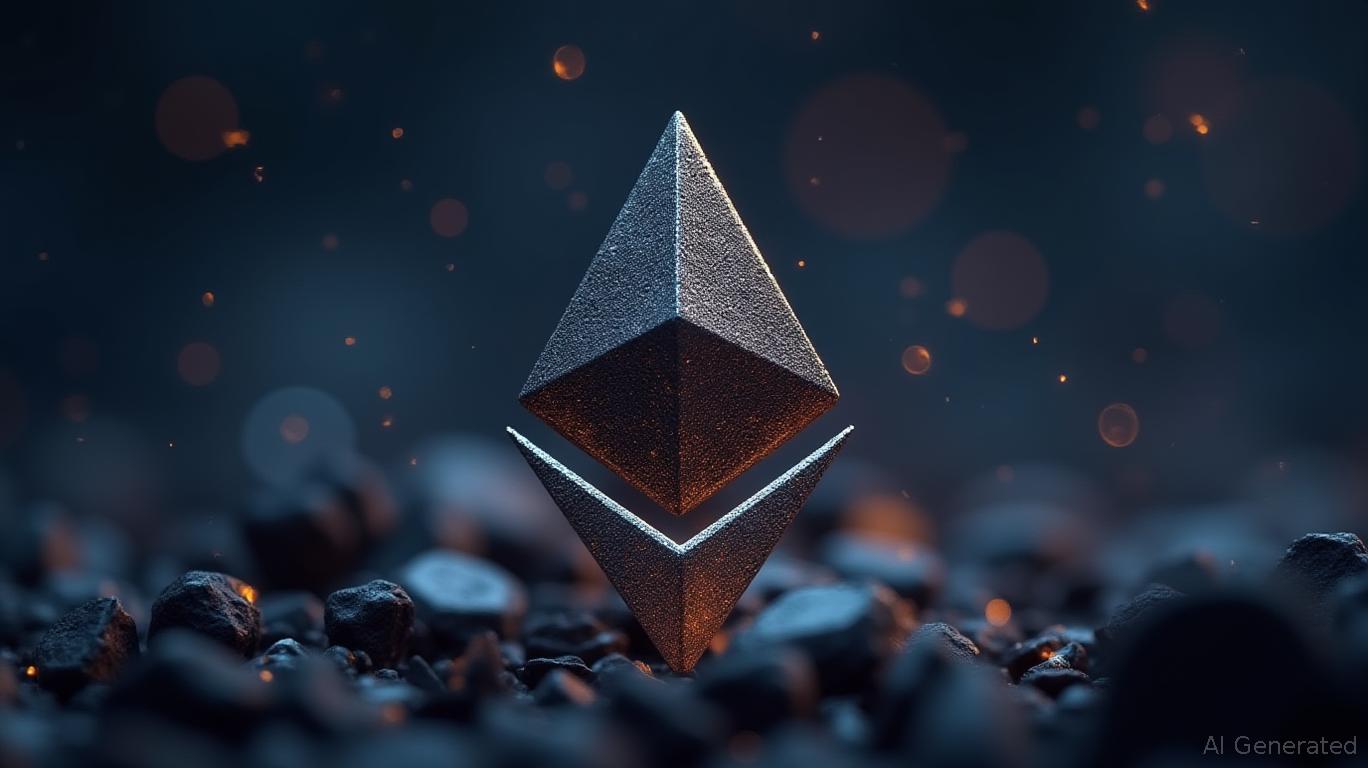Coin WorldFriday, Jul 18, 2025 6:50 am ET
![]() 4min read
4min read
SharpLink Gaming, a Nasdaq-listed firm, has made headlines with its latest acquisition of Ethereum (ETH), purchasing an additional 18,712 ETH valued at $65.45 million. This move underscores the company’s aggressive strategy in the digital asset space and highlights a growing trend of mainstreaming crypto as a legitimate corporate reserve asset. The acquisition, first reported by Onchain Lens on X, comes after SharpLink Gaming dramatically increased its authorized common stock issuance from $1 billion to $6 billion, specifically to support further ETH acquisitions. This significant increase in stock issuance indicates a clear long-term vision, suggesting that SharpLink Gaming views Ethereum as a fundamental component of its future financial architecture, potentially as a strategic hedge or a foundational element for new business ventures within the Web3 ecosystem.
The choice of Ethereum by companies like SharpLink Gaming is strategic. Ethereum is the foundational blockchain for a vast and rapidly expanding digital economy, powering decentralized finance (DeFi), non-fungible tokens (NFTs), and countless decentralized applications (dApps). Its smart contract capabilities allow for programmable money and complex financial instruments, making it a hub for innovation. The sheer size and activity of the Ethereum ecosystem provide a level of stability and future potential that appeals to institutional investors. Additionally, Ethereum’s successful transition to Proof-of-Stake (known as ‘The Merge’) has significantly reduced its energy consumption and introduced the possibility of staking rewards, offering a potential yield on held assets. With EIP-1559 and the burning of transaction fees, ETH has introduced a deflationary mechanism, potentially making it a scarcer and more valuable asset over time.
SharpLink Gaming’s substantial ETH acquisition is part of a broader trend of institutional crypto adoption. For years, cryptocurrencies were viewed with skepticism by mainstream finance, often dismissed as speculative and volatile. However, that narrative is rapidly changing. Major players like MicroStrategy have made Bitcoin their primary treasury reserve asset, and asset managers have launched spot Bitcoin ETFs, bringing crypto exposure to a wider range of investors. This shift signifies validation, diversification, and a technological imperative for institutions to recognize blockchain technology and digital assets as a fundamental shift in finance and technology. The increasing involvement of institutions brings greater liquidity, stability, and regulatory scrutiny to the market, paving the way for even wider adoption in the future.
Building corporate ETH reserves involves a sophisticated approach to treasury management, risk assessment, and operational integration. Companies like SharpLink Gaming are deciding what percentage of the treasury to allocate to digital assets, ensuring the secure storage of digital assets, navigating complex accounting rules, developing strategies to manage price volatility, and exploring yield generation through staking. This forward-thinking move positions companies at the forefront of the digital economy, allowing them to benefit from the growth of blockchain technology and potentially hedge against traditional economic pressures.
The fact that SharpLink Gaming is a Nasdaq-listed crypto entity makes its recent ETH acquisition particularly impactful. Publicly traded companies operate under a different set of rules and scrutiny compared to private firms. Their financial decisions are transparent, impacting shareholder perception, regulatory compliance, and broader market sentiment. For Nasdaq-listed crypto companies, SharpLink’s aggressive strategy carries several implications, including increased scrutiny and precedent, investor confidence, regulatory dialogue, and market maturation. The growing number of public companies holding significant crypto assets will undoubtedly accelerate the dialogue around clear regulatory frameworks, providing clearer guidance on accounting, taxation, and custody for digital assets held by public entities.
While the strategic benefits of building significant Ethereum reserves are clear, it’s crucial to acknowledge the inherent challenges and risks involved, especially for a publicly traded entity like SharpLink Gaming. The crypto market, despite its growth, remains significantly more volatile than traditional asset classes. The most obvious risk is the fluctuation in ETH’s price, which could negatively impact SharpLink’s balance sheet and potentially its stock price. Managing this risk requires sophisticated financial modeling and potentially hedging strategies. Additionally, the global regulatory landscape for cryptocurrencies is still evolving, and changes in laws or new restrictions could impact the value, liquidity, or even the legality of holding large crypto reserves. Public companies are particularly vulnerable to these shifts. Holding millions of dollars in digital assets requires top-tier cybersecurity, and hacks, phishing attempts, or vulnerabilities in custody solutions could lead to significant financial losses. Public and shareholder perception also play a role, as some investors might view such forward-thinking moves as overly risky or outside the company’s core business, potentially leading to investor skepticism or even legal challenges.
SharpLink Gaming’s bold foray into substantial Ethereum acquisitions serves as a compelling case study for the future of corporate treasury management and digital asset strategies. This move isn’t just about accumulating crypto; it’s about a fundamental re-evaluation of what constitutes a valuable corporate asset in the 21st century. We can anticipate several key developments emerging from this trend, including increased corporate exposure to digital assets, refined treasury management, regulatory evolution, and new business models leveraging these assets. The actions of SharpLink Gaming are a powerful signal that digital assets are moving from the periphery to the core of corporate finance, shaping the future of investment and business strategy.
For investors, SharpLink Gaming’s significant Ethereum acquisition offers valuable insights. When publicly traded companies commit substantial capital to an asset like ETH, it reinforces the belief in its long-term viability and growth potential beyond short-term speculation. This suggests that Ethereum’s utility and ecosystem are being taken seriously by sophisticated financial players. Investors should monitor institutional buying and selling trends, understand the fundamentals of why companies are investing in assets like Ethereum, and consider diversification within their own portfolios. Ultimately, SharpLink Gaming’s move underscores that digital assets are no longer a niche curiosity but a serious consideration for corporate treasuries and a growing force in global finance.
SharpLink Gaming’s consistent and substantial acquisition of Ethereum (ETH), culminating in this latest $65.45 million purchase, marks a pivotal moment in the ongoing narrative of institutional crypto adoption. It’s a powerful declaration from a Nasdaq-listed firm that digital assets, particularly Ethereum, are not just speculative ventures but fundamental components of a forward-looking corporate strategy. By raising its authorized stock issuance to fuel these acquisitions, SharpLink Gaming is not merely dipping its toes; it’s diving headfirst into building significant corporate ETH reserves, signaling unwavering confidence in the asset’s long-term value and utility. This bold move will undoubtedly resonate across the financial landscape, potentially inspiring other companies to re-evaluate their own treasury strategies and embrace the burgeoning digital economy. The era of digital assets as core corporate holdings is truly upon us, driven by pioneering firms like SharpLink Gaming.

